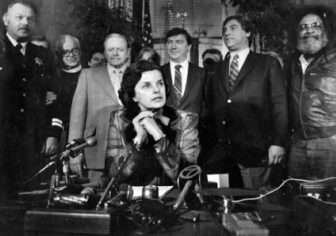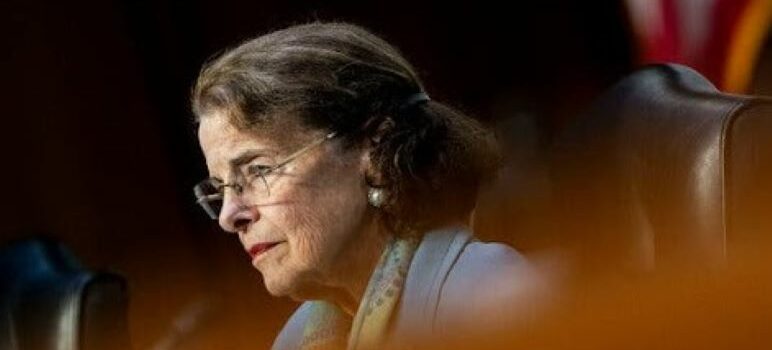Sen. Dianne Feinstein, the trailblazing Democratic power broker who served in the Senate for 30 years, died on Thursday night, according to a family member.
In recent years, Feinstein, 90, had suffered from frail health and memory issues that made it difficult for her to function alone and prompted calls for her to step down, which she consistently rejected.
Her condition had grown more acute over the past several months, after a bout with shingles that caused serious complications, including a case of encephalitis, and prompted her to begin using a wheelchair in the halls of the Capitol.

Dianne Feinstein, who served for nine years as San Francisco mayor, signing an anti-gun bill at City Hall in San Francisco in 1982.
Steve Ringman/San Francisco Chronicle, via Getty Images
Feinstein’s long and very public decline shed a spotlight on the advanced age of members of Congress and particularly the Senate, where many continue to serve long after retirement age.
Her staff was being officially informed of her death at 9am EDT.
A spokesman for her Senate office did not immediately respond to a request for comment.
On Capitol Hill, where the Senate is racing to pass a temporary spending bill to avert a government shutdown at midnight on Saturday, her absence was unlikely to have an immediate impact. Her vote had not been expected to be determinative for passing that measure, which has broad bipartisan backing.
Senator Chuck Schumer, the majority leader, just took to the Senate floor to honor Senator Dianne Feinstein with a moment of silence. Her chair was draped in black velvet and adorned with a vase of white roses.
Schumer described Feinstein as “a giant in the Senate. Sen. Dianne Feinstein was one of the most amazing people who ever graced the Senate, who ever graced the country.”
Among friends and formers staffers, the news of the senator's death spread quickly. “Our nation today lost a true pioneer, a giant of the Senate, a prolific legislator in Dianne Feinstein,” her former communications director, Scott Gerber, now the cofounder of a tech public relations firm, texted early Friday.
California Gov. Gavin Newsom has pledged to appoint a Black woman to temporarily fill any Senate vacancy in the state. Earlier this month, he ruled out selecting one of the current candidates vying for Feinstein’s seat in the 2024 election. He said he did not want to tip the balance of an upcoming primary in March.
For generations, she has been an iconic American political figure — a leader on issues from the environment to assault-style weapons, the longest-serving senator ever to represent California, the first woman to make it to the top of San Francisco’s political system, catapulted there after a still-shocking burst of gun violence.
On Tuesday, announced that she would finish out her term but not seek re-election next year. Colleagues, critics and an increasingly restive field of aspiring successors have questioned her health and fitness for office — a concern, her supporters noted, that few have raised for male octogenarians in the Senate — but friends said she made her decision on her own timetable.
“She has a level of integrity that’s unusual — she really thinks about the merits, more than most,” said Jerry Brown, 84, a fellow Democrat who was California’s longest-serving governor when he left public office in 2018. “She gives her all to the job. And I think it has been difficult for her to come to the end.”
Annie Karni is a reporter with The New York Times. Copyright, The New York Times, 2023.


Yes, we’re waiting to see what Newsom does with the racist, sexist qualifications on a successor. The interesting thing will be who all will be in the primary and be excluded, and if Newsom “changes his mind” about qualifications later and lets anyone in who doesn’t check both boxes or who will be in the primary and give them effective pre-election and incumbency before they actually run (for full term #1).
High Priestess of the War Pigs